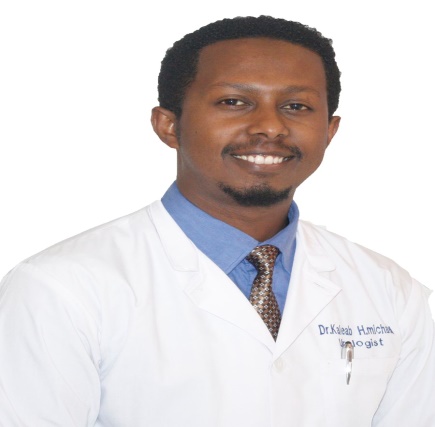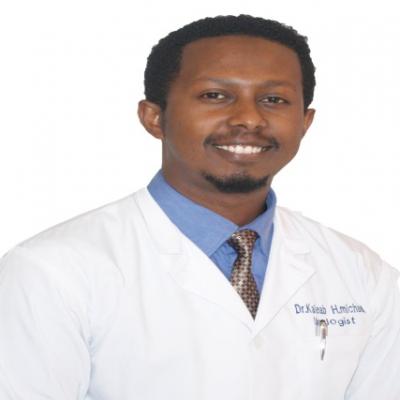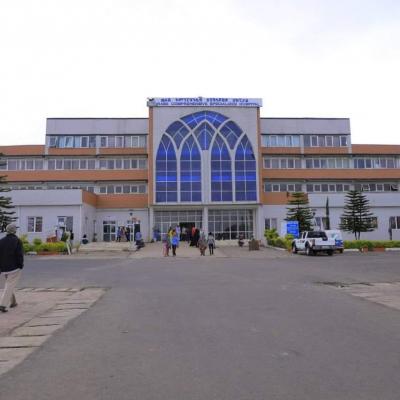1. UroMaG_Afrik: First of all, could you please introduce yourself briefly to our audience?

* Thank you for the invitation and i am glad toparticipate in the UroMaG Afrik’s initiative to improve and promote urology care in sub-saharan Africa. I am a consultant urologist born and raised in Addis Ababa, Ethiopia. I am the third child to my family and the first to be a physician. I had a deep interest to become a medical doctor sice my elementary and highschool years and i worked hard to join Hawassa University Medical School.
I worked as a university lecturer and GP for two years after my graduation at which time
i developed a strong desire to persue my career as a Urologist. Hence, I joined St. Paul’s Hospital Millennium Medical Coollege in Addis Ababa and did a 5 year long urology specialty training. I am currently working as a consultant urologist. My interests are minimally invasive urology, uro-oncology and Andrology. I also have a strong desire to lead various multi-center and global urology research projects. During my spare time, i like hiking, watching movies and reading books. Thank you.
2. UroMaG_Afrik: Is urology a choice or a matter of circumstance for you?
* I chose urology ! It is a field that i would choose again if i had to go back to my younger self. It is a new surgical specialty with fascinating surgeries, instruments, and rapidly changing discoveries. The fact that you can do much the work using minimally invasive technologies made me realize that you dont have to always cut through the patients to surgically treat them. This reality attracted me and i chose it.
3. UroMaG_Afrik: Could you briefly describe your journey to become a urologist?
* My journey to join urology residency was tough. I had to prepare for written exam for more than 8 months as the specialty was ; and still is, highly competitive. Moreover, i had to prepare myself for the interview which went very well for me. I spent five years training to become a urologist though there was a few months of gap during the covid-19 pandemic. I went through long duty hours, tiresome and challenging surgical procedures, difficult exams and research thesis projects during my residency. During my final year, i was a chief resident and had extra commitments to fulfill which made my days busy. In a hindsight, I consider myself very productive in those five years. I published my first case report while I was a 3rd year resident and it broke my fear towards research work. It gave a the courage to continue in that path and I published many more thereafter. I am a member of many international societies and initiatives that gave me the opportunity to travel to Europe multiple times to participate in conferences and fellowships.
4. UroMaG_Afrik: What is your area of expertise in urology?
* Currently I am a general urologist operating on most of the urology cases including cancer, stone, stricture, infertility and incontinence. However, I am inclined more towards minimally invasive urology and uro-oncology.
5. UroMaG_Afrik: Please briefly tell us about your country of practice. What should one know about this African country?
* Ethiopia is an east African country of 120 million people. It is the second most populous nation second to Nigeria. Much of the population is in the young age category (15-31 yr) and there are more than 80 ethnic groups distributed all over the country with their own language, custom and tradition. Ethiopia is known for a couple of major things in the world and these are ; archeologically being origin of mankind, birth place of coffee, home of many famous athletes, the famous Ethiopian Airlines and also known for being the only African country that has never been colonized by foreign power. Addis Ababa is the capital city and is the center for African Union (AU) Head Quarters.
6. UroMaG_Afrik: How is urology developing in your country?
* The health care system in Ethiopia has been challenged by many factors like poor accessibility, lack of budgeting and employment, trained man power and efficient leadership. However, more recently some changes, though not adequate, are emerging. In the past years urology was sub-speciality program where general surgeons have to do a 3 year fellowship to become a urologist. In the past 15 years however, a new curriculum has been implemented and general practitioners can join a 5-year urology residency directly. Currently there are three medical schools in the country with a dedicated urology residency program. There are a total of 65 urologists in the country and among them, only two are females. The growth of urology as a specialty was going somehow slowly until recently where the Urology Society of Ethiopia (USE) is established as a representative body to identify the training gaps and service delivery. Hopefully, in the coming few years it gets well organized and lead the much needed change in the field.
7. UroMaG_Afrik: What are the main urological pathologies encountered in your country, and what is the extent of the need for care?
* We commonly see stone diseases, BPH, urethral stricture and male factor infertility among the benign pathologies. Urological cancers are also common especially of kidney, prostate and bladder origin. Urologic cases in general are so common that they account for one-third of all surgical cases in many hospitals. The need is further increasing with the rise in the society’s awareness and socioeconomic status. As more and more diagnostic modalities are being introduced at a hospital level, many urologic pathologies are being diagnosed and referred to a urologist.
8. UroMaG_Afrik: Where can one find a urologist in your country, and what resources are available for urological care?
* Many urologists practice in the capital city and other major cities. Most government hospitals in Addis Ababa have at least one urologist. However, when it comes to resources, there is an alarming scarcity. There are many urologists that practice without the basic urologic instruments in the government hospitals. There is better resource availability in private hospitals where many specialists practice on a part-time basis. Services such as LASER lithotripsy, ECSW, Laparoscopy are available in these private setups and many patients get served there.
9. UroMaG_Afrik: Are the resources sufficient to meet the needs in urology?
* Definitely NO ! Many challenges are being faced by urologists practicing in Ethiopia. The two most important ones are; lack of expertise and lack of equipment. There is no much urology sub-specialty service in Ethiopia due to lack of fellowship opportunities. Some services such as transplant urology are emerging well but there is still visible lack in trained manpower. Urologic equipment shortage is at its climax in Ethiopia. There are many hospitals in the country with a staff urologist and without even the basic urologic instruments such as cystoscopy set. This made patients to seek referral to private hospitals where both the equipment and specialist are available. The accessibility of resources are even lower outside the capital city making urology patient referral a very harsh reality for our patients, many of whom are elderly.
10. UroMaG_Afrik: What are the needs in andrology in your country, and what initiatives are being taken to address them?
* Andrology is a relatively new concept in Ethiopia. There is one governmental infertility treatment center in Addis Ababa, where both male and female factor infertility cases are treated. However, there is no trained andrologist in the country and the service is given by general urologists. Many surgical procedures such as AUS, Penile implant, and scrotal microsurgeries are not being given in Ethiopia and many patients needing the service have to travel abroad.
11. UroMaG_Afrik: A message for the population of your country?
* There is some misconception about the field of urology in the general community. A urologist is a surgical specialist who diagnose and treat diseases of the kidney, ureter, bladder, prostate and male genitalia in general. The treatment can be surgical or non-surgical and does not involve dialysis (which is done by a nephrologist). The general population should be cautious about symptoms arising from these areas and should see a urologist without delay.
12. UroMaG_Afrik: Any final words?
* UroMaG Afrik is a very promising initiative aimed at improving African Urology in every aspect and I am glad to be part of it. Adding a Urology in Your Country section on the official website is also a clever thought and I would like to thank Dr. Justin Ouima for taking the lead. I am hopeful that a significant progress will be made in the work we do very soon.
13. UroMaG_Afrik: Thank you very much for allowing us to explore the urological potential in your country.
* You are welcome.





